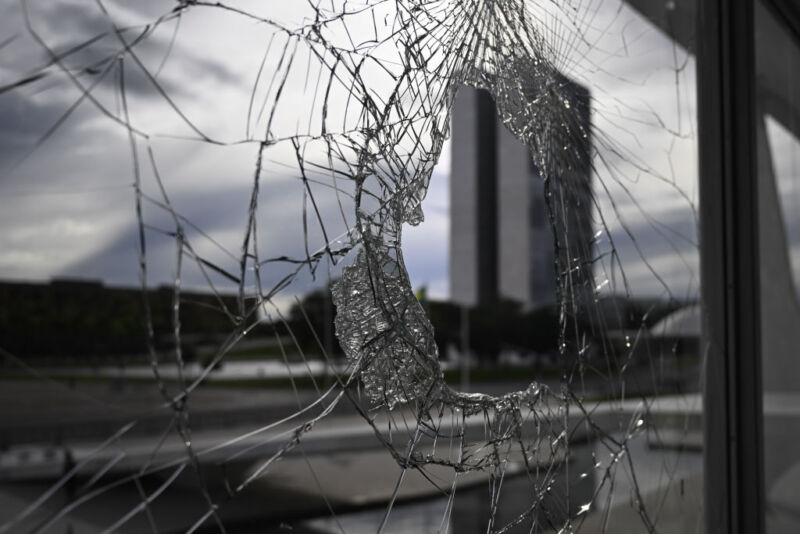

Brazil riots trigger widespread content bans on Facebook, YouTube
source link: https://arstechnica.com/tech-policy/2023/01/brazil-riots-trigger-widespread-content-bans-on-facebook-youtube/
Go to the source link to view the article. You can view the picture content, updated content and better typesetting reading experience. If the link is broken, please click the button below to view the snapshot at that time.

Content mods as riot police —
Brazil riots trigger widespread content bans on Facebook, YouTube
Content moderators began working with Brazilian authorities before the election.
Ashley Belanger - 1/10/2023, 5:44 PM

Claiming “election interference” in Brazil, thousands of rioters on Sunday broke into government buildings in the nation’s capital, Brasília. The rioters relied on social media and messaging apps to coordinate their attacks and evade government detection, The New York Times reported, following a similar “digital playbook” as those involved in the United States Capitol attacks on January 6, 2021. Now, social media platforms like Facebook and YouTube have begun removing content praising the most recent attacks, Reuters reported, earmarking this latest anti-democratic uprising as another sensitive event requiring widespread content removal.
Disinformation researchers told the Times that Twitter and Telegram played a central role for those involved with organizing the attacks, but Meta apps Facebook and WhatsApp were also used. Twitter has not responded to reports, but a Meta spokesperson told Ars and a Telegram spokesperson told Reuters that the companies have been cooperating with Brazilian authorities to stop content from spreading that could incite further violence. Both digital platforms confirmed an uptick in content moderation efforts starting before the election took place—with many popular social media platforms seemingly bracing for the riots after failing to quickly remove calls to violence during the US Capitol attacks.
“In advance of the election, we designated Brazil as a temporary high-risk location and have been removing content calling for people to take up arms or forcibly invade Congress, the Presidential palace, and other federal buildings,” a Meta spokesperson told Ars. “We're also designating this as a violating event, which means we will remove content that supports or praises these actions.“
A Telegram spokesperson told Reuters that the app supports users’ rights to free speech and peaceful protests. However, the private messaging app is monitoring public-facing parts of the platform and responding to user reports to swiftly remove “calls to violence,” which the platform has “explicitly forbidden.”
The attacks in Brazil lasted more than three hours, drawing crowds of tens of thousands. Rioters ransacked the nation’s top court and vandalized some of the country’s most important art collections. So far, 1,500 people have been arrested, Reuters reported.
AdvertisementBBC reported that these most recent attacks were stoked by some of former US President Donald Trump’s allies, including Steve Bannon. The former White House chief strategist pushed “baseless rumors” falsely claiming election fraud under the hashtag #BrazilianSpring. “All hell is going to break loose tomorrow,” Bannon predicted on his podcast, according to BBC. After the attack, Bannon described the Brazilian rioters as “freedom fighters.”
In 2021, many social media platforms banned Trump after the platforms were heavily criticized for failing to remove calls to violence and misleading content about US election fraud. In November, Twitter reversed its ban on Trump, and Meta spokesperson Andy Stone told The Washington Post this week that Meta would in the coming weeks decide if it would also be reversing its Trump ban. The Post reported that whatever Meta decides could influence YouTube’s decision about whether or not to bring Trump back. Meanwhile, Trump has seemed content to stick to posting on his own social media platform, Truth Social. Some lawmakers have complained that he “has continued to post harmful election content" there.
No digital platforms have yet responded to Ars’ request for comment on how the January 6 attacks on the US Capitol informed their strategies for preventing calls to violence from spreading on Sunday in Brasília.
YouTube spokesperson Ivy Choi told Ars that the video-sharing platform would “remain vigilant” and remove livestreams and videos inciting violence in Brazil. It will also combat election misinformation by “prominently surfacing authoritative content on our homepage, at the top of search results, and in recommendations,” Choi said.
Choi said YouTube will also not serve ads on any content inciting violence in Brazil, per the company's “sensitive events” advertiser guidelines. YouTube’s ad policy provides a window into how digital platforms' policies have become more nuanced since the US Capitol attacks. On January 6, 2021, YouTube’s guidelines counted among sensitive events any “atrocious acts that result in the loss of human lives” (such as mass shootings), armed conflict, death, tragic events, and terrorist acts. Today, YouTube’s policy describes a sensitive event as any event “with significant social, cultural, or political impact, such as civil emergencies, natural disasters, public health emergencies, terrorism and related activities, conflict, or mass acts of violence.”
Recommend
About Joyk
Aggregate valuable and interesting links.
Joyk means Joy of geeK